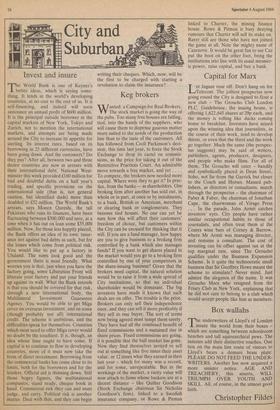City and
Invest and insure
The World Bank is one of Keynes's better ideas, which is saying some- thing. It lends in the world's developing countries, at no cost to the rest of us. It is self-financing, and indeed will soon announce an annual profit of $600 million. It is the principal outside borrower in the capital markets of New York, Tokyo and Zurich, not to mention the international markets, and attempts are being made around the City to increase its appetite for sterling. Its interest rates, based on its borrowing in 25 different currencies, have been going down. And the customers? Do they pay? After all, between two and three dozen countries are now in arrears with their international debt. National West- minster this week provided £160 million for bad and doubtful debts on a half year's trading, and specific provisions on the international side (that is, not general caution, but identified duds) more than doubled to £52 million. The World Bank's arrears, says Moeen Qureshi, the tall Pakistani who runs its finances, have been fluctuating between $300,000 and zero, at a time when it has out on loan some $35,000 million. Now, for those less happily placed, the Bank offers an idea of its own: insur- ance not against bad debts as such, but for the losses which come from political risk. You would like to put up a factory in Ululand. The sums look good and the government there is most friendly. What worries you is that, just when you have the factory going, some Liberation Front will liberate your factory and put your friends up against its wall. What the Bank intends is that you should be covered for that risk, through a new international body, the
Multilateral Investment Guarantee Agency. You would be able to get Miga cover on overseas investment, and on some (though probably not all) international credit. The scheme is ambitious, and the difficulties speak for themselves. Countries which most need to offer Miga cover would no doubt be the touchiest. It is, though, an idea whose time ought to have come. If capital is to continue to flow to developing countries, more of it must now take the form of direct investment. Borrowing from the commercial banks has come close to its limits, both for the borrowers and for the lenders. Official aid is thinning down. Still those bogey figures, the multinational companies, stand ready, cheque book in hand. Commercial risk they can and must judge, and carry. Political risk is another matter. Deal with that, and they can begin writing their cheques. Which, now, will be the first to be charged with starting a revolution to claim the insurance?






































 Previous page
Previous page